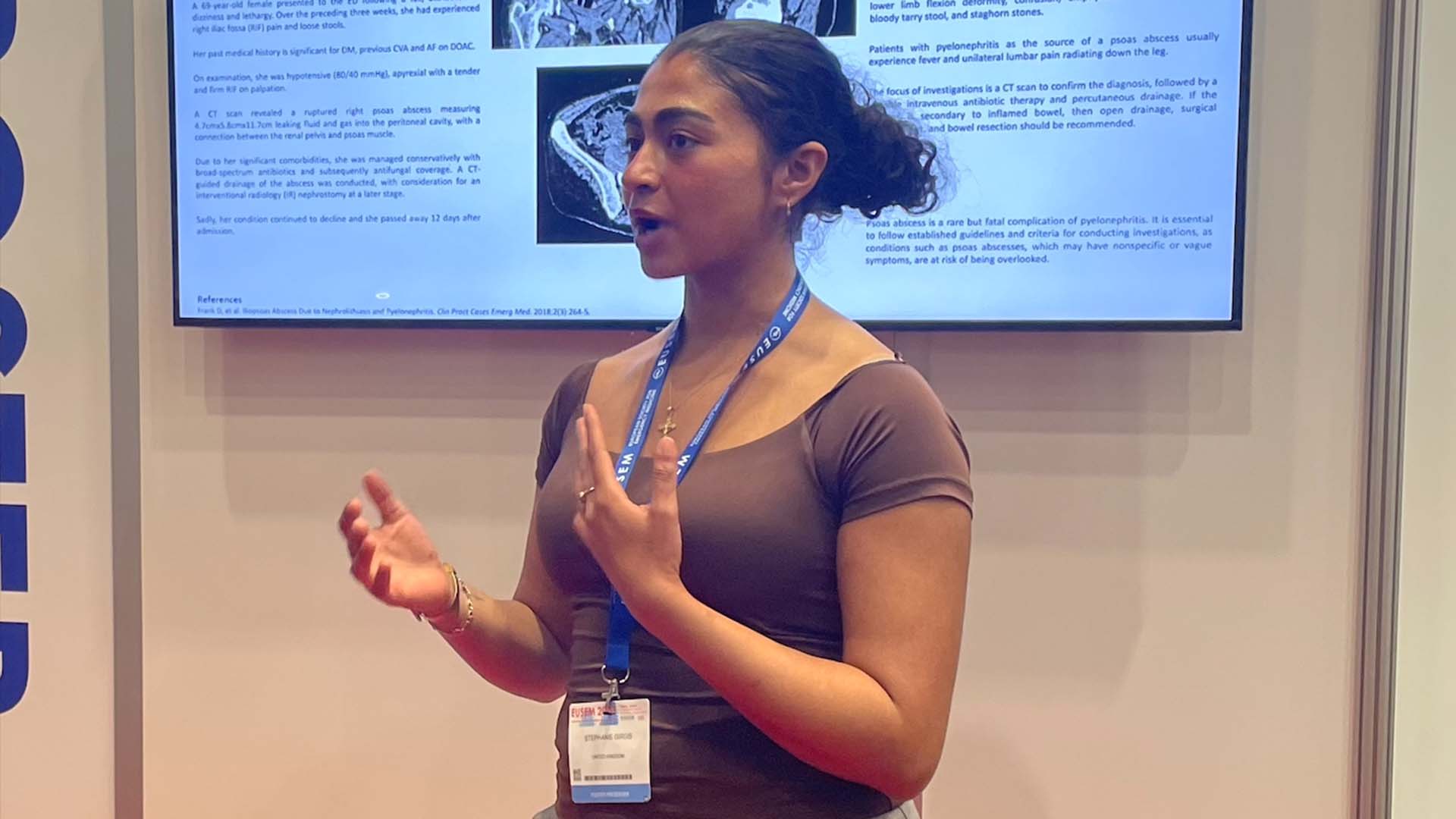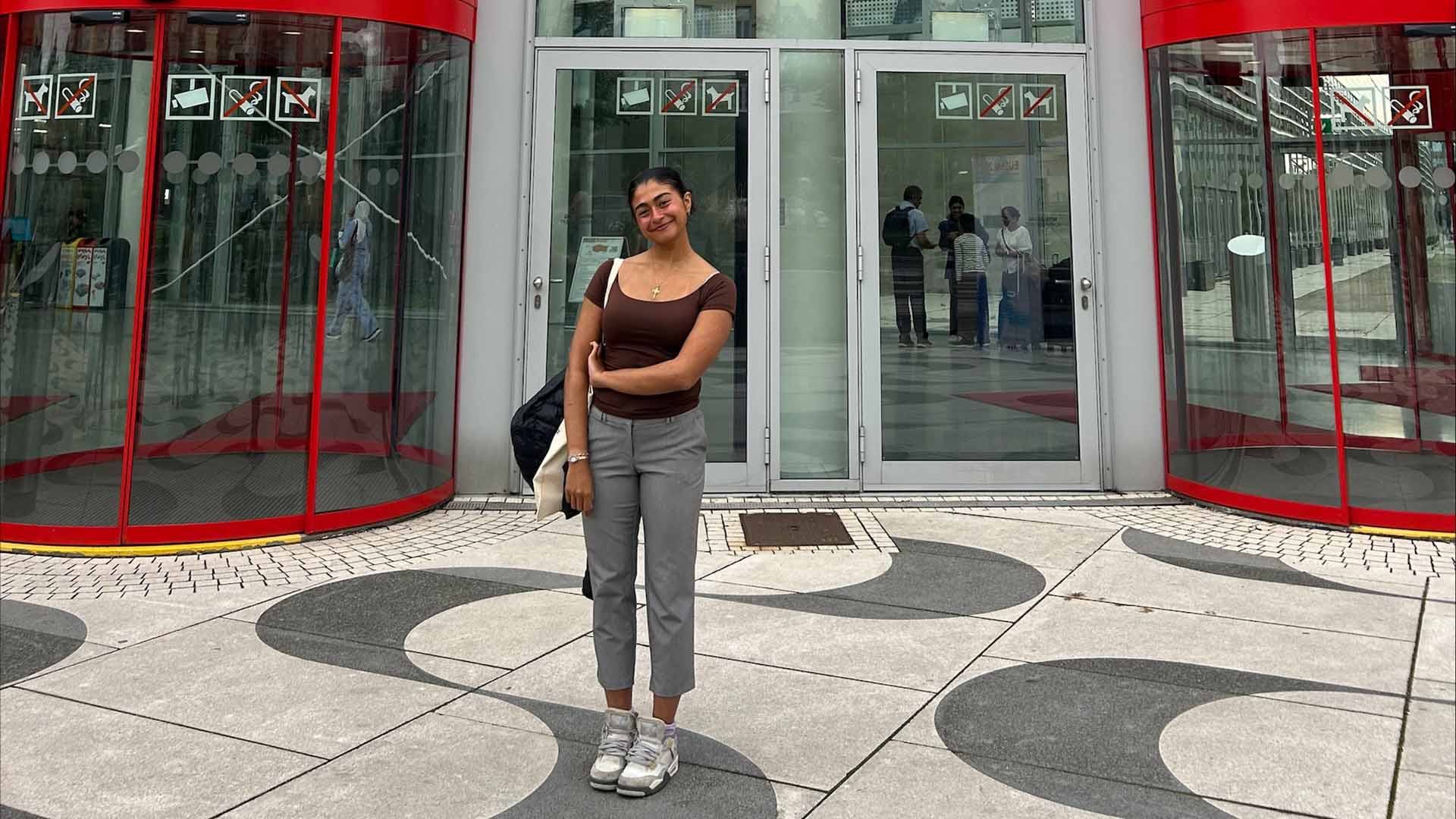
Fresh off presenting her research into uncommon presentations in the Emergency Department at the European Emergency Medicine Congress in Vienna, Year 5 Student Doctor Stephanie Girgis is keen to pass on her tips and tricks to carrying out (and enjoying!) research while still at undergraduate level. If that’s your kind of thing, you’re never short of opportunities here at Liverpool.
I recently presented two poster presentations at the European Emergency Medicine Congress in Vienna on uncommon presentations in the Emergency Department — one on psoas abscess and another on thyrotoxicosis. Both focused on the importance of early imaging, keeping an open mind with atypical symptoms, and acting quickly to prevent complex outcomes. I presented these alongside Dr. Abdo Sattout, a Consultant in Emergency Medicine at Aintree.
Getting involved in research in medicine has been such a great experience — it really helps build analytical thinking, presentation and communication skills, and teamwork, all while strengthening your portfolio. I also got to meet so many doctors from around the world and was able to exchange contacts for future opportunities to collaborate and get involved in more projects.
How to Get Involved in Research
The best place to start? Your placements!
If you’ve ever enjoyed working with a consultant or registrar, ask them if they have any ongoing audits, quality improvement projects, or case reports you can contribute to.
Do you have a particular subject you’re interested in? Find out who the lead is on that placement or ask your educational supervisor if there are any related projects you can join.
Another option is to look out for speaker or poster abstract calls - these pop up through small local meetings, medical school research conferences, and even international ones. Once you’re there, you can also connect with other presenters and collaborate on future projects together.
Here in Liverpool, we’re lucky to have research integrated into every year — from RS projects in Years 1–3, to opportunities for intercalation, and later in Years 4 and 5 through elective and SAMP placements. You could always reach out to people you’ve worked with during those projects if there’s something specific that interests you — sometimes these can even continue beyond the year and lead to publications or conference presentations.
What Does “Presenting at a Conference” Actually Mean?
When I first heard about presenting at a conference, I thought it sounded so daunting — but once I got there, I realised how relaxed and friendly it actually was!
There are a few different ways to present:
If you’re not a fan of public speaking, you can submit an abstract and create a poster that will be displayed for people to walk around and read. Sometimes, these are accompanied by a short 4-minute presentation with a minute for questions.
If you love to chat (like me!), you might prefer going for an oral presentation. These are usually around 10 minutes long and often include a PowerPoint to explain your research.
Both options are great ways to share your work, get feedback, and meet others with similar interests.
 Stephanie at the European Emergency Medicine Congress in Vienna
Stephanie at the European Emergency Medicine Congress in Vienna
Research Doesn’t Have to Be Boring!
Research isn’t just scrolling through PubMed and reading countless articles (unless that’s what you enjoy!). There are so many ways to get involved depending on what interests you most — whether it’s exploring data, improving patient care, or investigating unusual cases.
Research
There’s a huge variety of research types to suit different interests. Just some examples:
- Case reports – writing up an unusual or interesting case you’ve seen on placement to share learning points
- Cross-sectional studies – collecting data from a population at one point in time
- Experimental studies – such as randomised controlled trials testing new interventions
- Systematic reviews – gathering and analysing all available research on a particular question or
- Meta-analyses – combining data from multiple studies statistically to produce stronger conclusion
- Quality Improvement (QI) Projects - QI projects focus on improving patient care by identifying a problem and testing small, measurable interventions to make a difference — for example, introducing a sepsis screening checklist to reduce delays in antibiotics.
- Audits - Audits look at whether clinical practice meets current standards or guidelines and identify areas for improvement — for example, reviewing discharge summaries to ensure safety-netting advice is consistently documented.
If you’ve ever thought about getting involved in research or presenting, just go for it! You’ll learn so much, build connections, and discover areas of medicine you might not have explored otherwise.
Discover more
- Feeling motivated by Stephanie’s advice and experiences? Feel free to get in touch with her for advice and help in getting started. You might also like to check out societies like the Liverpool Research Society, who love encouraging medical research.
- The MBChB programme at Liverpool gives you plenty of opportunities to develop your research skills through our Research & Scholarship theme, running up until Year 3, and then during your 6-week SAMP placement in Year 5. Take a look at our A100 and A101 (graduate entry) course options.
- We love to support your research ambitions. Take a look at Student Research to see how the School can help you in conducting research, and attending conferences, as well as ensure you tick all the boxes when setting up your own research projects.